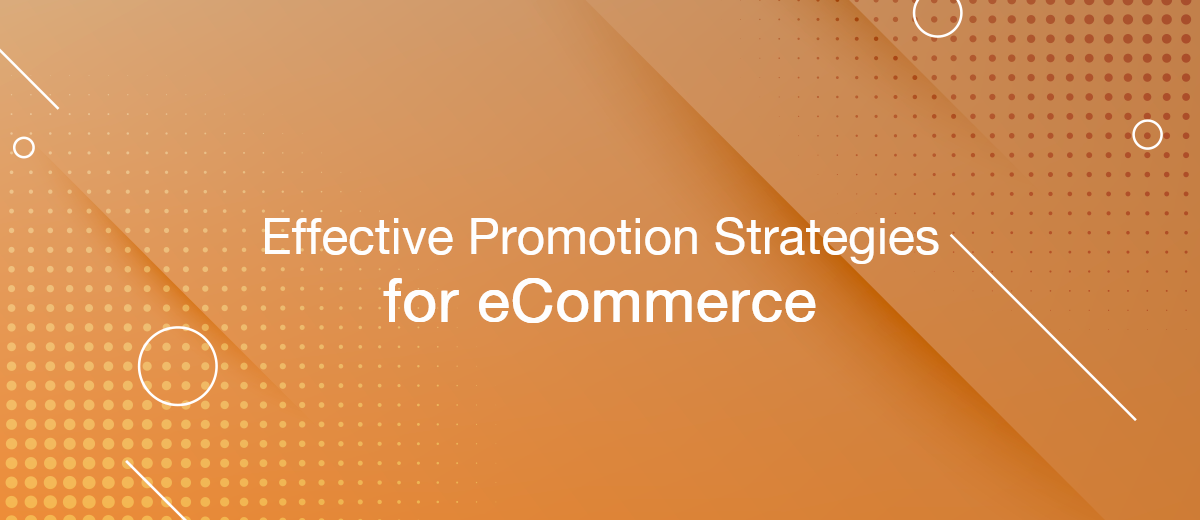4 Effective Online Promotion Strategies for Your eCommerce Business
As the number of ecommerce businesses grows, it becomes harder and harder for each business to stand out. Only the businesses that invest in effective promotion strategies will succeed. In this article, you’ll learn four effective online promotional strategies for ecommerce businesses.
Search Engine Optimization (SEO)
Search Engine Optimization (SEO) is an online marketing strategy that involves optimizing your site to help it rank higher on search engines. It’s one of the eCommerce promotion tips you shouldn’t overlook.
SEO is crucial for eCommerce businesses because customers go on search engines to find what they need. In fact, 53 percent of shoppers research before they buy. More research also indicate that the top three search results get the highest clicks, with the top result getting 27% of all search traffic.
That means you need SEO to help your eCommerce store rank higher and attract more potential buyers. Here are things you need to do to optimize your eCommerce site for search engines.
Keyword optimization
Keyword optimization involves adding your target keywords at strategic places throughout your site. For example, you can add relevant keywords on a product page to help it rank for that keyword. You can also include keywords in the URL and image alt text. Here are some types of keywords you need to know:
Short-tail keywords
A short tail keyword is a search query that’s typically just one word. It is very general and has a high search volume. For instance, when you search “shoes” on Google, the results will be all types of shoes.
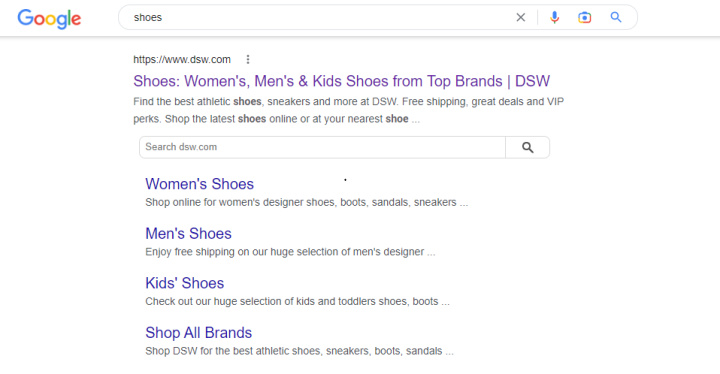
These keywords are usually hard to rank for. That’s why smaller eCommerce sites should target long-tail keywords instead.
Long-tail keywords
Long tail keywords are keywords with more than one word. They have a very specific intent and tend to be less competitive. For instance, “best shoes for men with flat feet” is a long-tail keyword.
You can identify these keywords using a keyword research tool. You can also use various Google features to identify them. Google’s autocomplete feature, for instance, helps. Just type in a phrase. You’ll find other keyword suggestions.
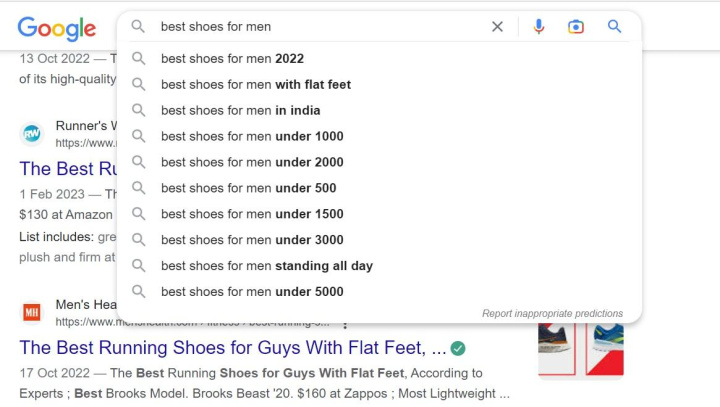
The “Related Searches” section at the bottom also provides additional keyword ideas.
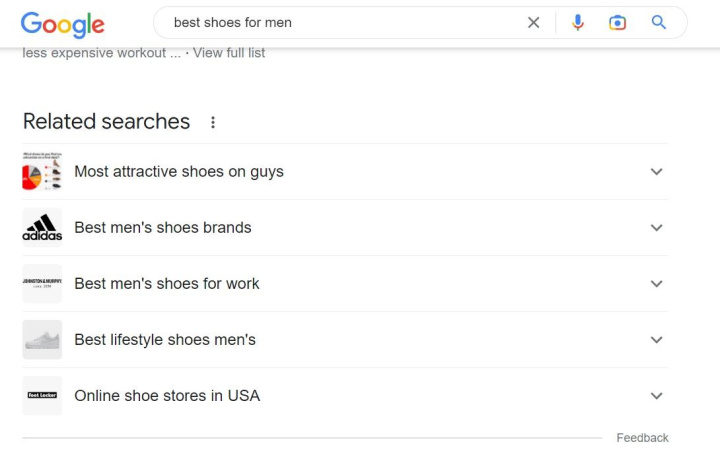
You can use these long-tail keywords or look for variations. You also have different types of keywords according to search intent.
Informational keywords
Informational keywords are keywords whose search intent is to learn. They answer the questions “how”, “why”, “where”, and “when”. Here is an example:
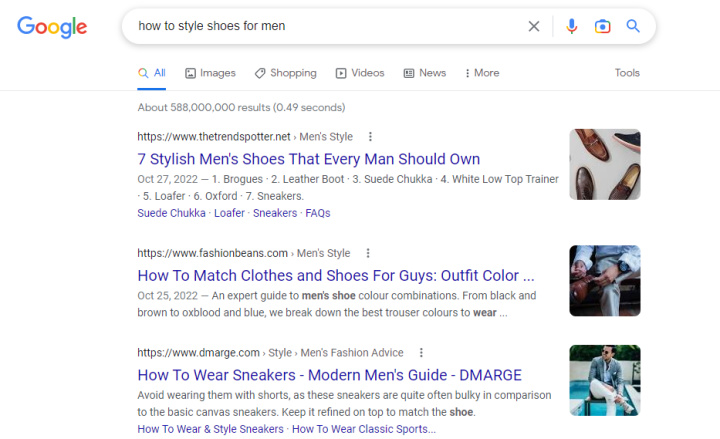
These keywords are great if you want to build a blog for your eCommerce store. They provide valuable information for potential customers who are still at the top of the sales funnel.
Commercial keywords
Commercial keywords express buying intent. They might include words like “buy”, “sale”, “offer”, “coupon code”, etc. Here’s an example:
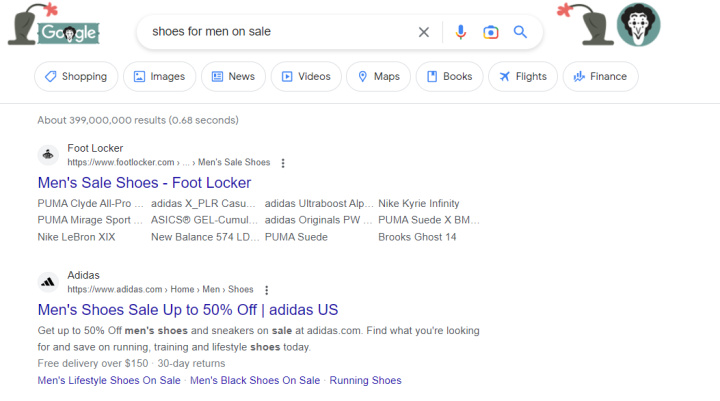
Perform exhaustive research to find the most suitable keywords for your eCommerce business. You can do this using tools such as Ahrefs, Google Keyword Planner, and Amazon Keyword Planner.
Site architecture
Your site architecture should be simple and easy to navigate through. Here is how you can optimize your site's architecture:
- Plan the flow of your website before creating it.
- Utilize internal linking and canonical tags.
Also, every product or service should be within reach in two clicks. That means creating great product categories that can help users and search engine crawlers navigate your site with ease.
Technical SEO
Technical SEO includes optimizing the technical aspects of your eCommerce website for web crawlers and users. It involves improving the site's speed and optimizing your site for mobile phones. For this, optimize your website images and use web caching. Make sure your web design is fully responsive, too.
Link building
Search engines consider the number of links, quality, and relevance when ranking pages. Therefore, your site should have quality backlinks to signal your site's reputation.


An effective backlink outreach campaign can help you secure quality backlinks. This could involve writing guest posts, distributing press releases, and creating linkable assets like guides, infographics, white papers, and case studies. For example, Amerisleep creates guides around the mattress and bedding niche. These help them secure backlinks while also attracting potential customers.
Getting your SEO right is the first step towards optimizing your ecommerce business. Here’s the second strategy.
Content marketing
Content marketing involves publishing valuable content your target audience enjoys. This can be informative content shared through videos, images, graphics, or blog posts. You can start a podcast, make an online course, among others.
Effective content marketing requires planning. So, you need to define the goal of the content marketing campaign and brainstorm content ideas for different stages of the customer journey before creating the content. You also need to analyze results to change your content marketing strategy if needed.
Make sure you pick a content marketing strategy that works for you, depending on the talent and resources you have. You can also collaborate with other online brands that complement your product offerings and create content together. Use email lookup tools to find their contact details. In your pitch, mention how the collaboration will benefit both of you.
Social media
You can use social media platforms to promote your goods and services, too. There are different ways you can use social media:
- organic social media marketing;
- paid advertising;
- influencer marketing.
Organic social media marketing
Organic social media marketing involves promoting your brand and products on social media without paying for advertisements. This could involve using regular posts, replying to comments, creating interactive content like social media quizzes and polls, etc. This strategy can help you create better relationships with your customer base.
Paid advertising
Social media advertising is when a brand pays a social media platform to show its content to a targeted audience. Paid social media ads increase eyeballs on your posts and can, hence, increase online sales.
Before paying for social media ads, research your target audience to know what channels they are on and their behavior on these social media platforms. This information will guide your strategy for social media advertising.
Influencer marketing
An ecommerce store will also benefit from engaging an influencer. An influencer holds sway over their audience. So, if they promote your products, you’re more likely to get conversions.

Before contacting an influencer (whether megainfluencers or microinfluencers), make sure your target audience and their audience align. Most importantly, monitor customer engagement rates. High engagement is always preferable.
Social media is great for promotion. We recommend combining the three strategies discussed above for the best results.
Email marketing
Email marketing involves using emails to market to prospective customers. It is among the best eCommerce promotion tips because email is cost-effective. To launch email campaigns, you need to collect your target audience’s email addresses. Email capture forms can help you collect these addresses and add them to your email list.
Provide incentives – like discount coupons – that encourage people to give their email addresses, too. For example, the brand offers a $10 discount coupon. All the person has to do is share their name and email address to receive it.
Once you have your email addresses, craft your emails. Email personalization is key. You need to send the customer an email tailored to their needs. For instance, send emails that include product recommendations related to the customer’s previous purchases.
You can also address a specific customer attribute or trait. For example, recommend certain products because you know the customer is located in a region that observes a certain occasion, e.g., Easter. Similarly, you may recommend seasonal sales like boots during winter and so on.
You’ll need to invest in an advanced email marketing solution with marketing automation features. This can help you track customer behaviors and send personalized emails. Send your promotional emails and newsletters regularly. Your goal is to nurture relationships with customers. You can’t do that if you send only one email.
In conclusion
You don’t need to be a rocket scientist to promote your ecommerce business. It requires time and resources. But if done correctly, the investment pays for itself.
In this article, you learned four eCommerce promotion tips. Leverage SEO, content marketing, and email marketing. Take advantage of social channels, too. Implement these strategies, and you’ll see results.
Do you want to achieve your goals in business, career and life faster and better? Do it with ApiX-Drive – a tool that will remove a significant part of the routine from workflows and free up additional time to achieve your goals. Test the capabilities of Apix-Drive for free – see for yourself the effectiveness of the tool.
